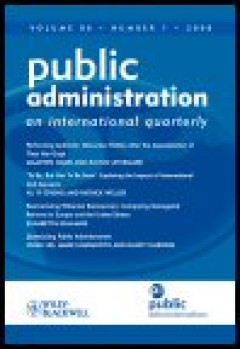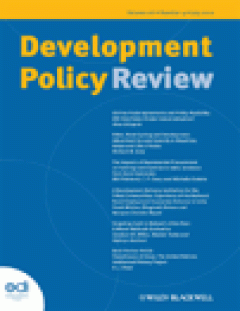Filter by

EXPLAINING THE UNEXPECTED SUCCESS OF THE SMOKING BAN IN ITALY: POLITICAL STRA…
The approval (2003) and enforcement (2005) of a smoking ban in Italy have been viewed by many as an unexpectedly successful example of policy change. The present paper, by applying a processualist approach, concentrates on two policy cycles between 2000 and 2005. These had opposing outcomes: an incomplete decisional stage and an authoritative decision, enforced two years later. Through the anal…
- Edition
- Volume 88, Issue 3, September 2010, pages 819–835
- ISBN/ISSN
- 00333298
- Collation
- -
- Series Title
- Public Administration
- Call Number
- -

TOWARDS GLOBAL SCHOLARSHIP IN PUBLIC AFFAIRS
One can imagine two futures for public administration, public management and public service around the world. A first would be what we see as a continuation of the status quo: with public administration essentially continuing as a series of national discourses, with perhaps a bit of cross-fertilization, but with this characterized by a classic core-periphery model. The preferable model, outline…
- Edition
- Volume 88, Issue 3, September 2010, pages 836–850
- ISBN/ISSN
- 00333298
- Collation
- -
- Series Title
- Public Administration
- Call Number
- -

PERSUASION AS GOVERNANCE: A STATE-CENTRIC RELATIONAL PERSPECTIVE
Debates about governance and the relationship between governance and government have focused upon markets, hierarchies and networks as principal modes of governance. In this paper we argue that persuasion constitutes a further and distinctive mode of governance, albeit one which interpenetrates other modes of governance. In order to assess the nature, limitations and scope of persuasion and the…
- Edition
- Volume 88, Issue 3, September 2010, pages 851–870
- ISBN/ISSN
- 00333298
- Collation
- -
- Series Title
- Public Administration
- Call Number
- -

IMPLEMENTING EVIDENCE-BASED POLICY IN A NETWORK SETTING: ROAD SAFETY POLICY I…
In the early 1990s, in order to improve road safety in The Netherlands, the Institute for Road Safety Research (SWOV) developed an evidence-based �Sustainable Safety� concept. Based on this concept, Dutch road safety policy, was seen as successful and as a best practice in Europe. In The Netherlands, the policy context has now changed from a sectoral policy setting towards a fragmented network …
- Edition
- Volume 88, Issue 3, September 2010, pages 871–884
- ISBN/ISSN
- 00333298
- Collation
- -
- Series Title
- Public Administration
- Call Number
- -

Market-Based Government and the Decline of Organizational Ethics
This article discusses ethical challenges posed by market-based government and the degree to which contracting enhances or diminishes government�s ability to ensure that organizations that deliver public services adhere to ethical practices and public values, such as lawfulness, transparency, and accountability. A case study of an organization�Blackwater (now, Xe)�vividly illustrates the consid…
- Edition
- Vol. 42 no. 6, October 2010.pp. 615-637
- ISBN/ISSN
- 00953997
- Collation
- -
- Series Title
- Administration & Society
- Call Number
- -

Belonging, Believing, Behaving: The Religious Character of Public Servants
How do public servants compare to the general public in their religious affiliation, beliefs, and behaviors? Using data from the 2004 General Social Survey, we compare public servants in government and outside government to the general public through a series of logistic regression models. Although there is little difference in terms of denominational affiliation, public servants have a stronge…
- Edition
- Vol. 42 no. 6, October 2010.pp. 694-719
- ISBN/ISSN
- 00953997
- Collation
- -
- Series Title
- Administration & Society
- Call Number
- -

Public–Private Partnership in Poland:A Cosmological Journey
A language barrier prevents us from understanding how other cultures look at public administration, as �semantic fields� differ between languages. These differences can never be fully grasped, but what we can do is study what happens when a particular concept crosses the border. In this article we select a concept, public�private partnership, that in recent times migrated from one administrativ…
- Edition
- Vol. 42 no. 6. October 2010.pp. 668-693
- ISBN/ISSN
- 00953997
- Collation
- -
- Series Title
- Administration & Society
- Call Number
- -

Intergenerational Justice Perceptions and the Role of Welfare Regimes: A Comp…
This study analyzes intergenerational justice perceptions among 2,075 undergraduate students in 1996-1998 across eight democracies spanning four welfare regime types. It examined how different regimes structure perceptions of (a) justness in principle of young-to-old public resource transfers and (b) actual contributions to and rewards from society of various age groups. Support in principle of…
- Edition
- Vol. 42 no. 6, October 2010.pp. 638-667
- ISBN/ISSN
- 00953997
- Collation
- -
- Series Title
- Administration & Society
- Call Number
- -

Taxation, Fiscal Decentralisation and Legitimacy: The Role of Semi-Autonomous…
This article analyses the Servicios de Administraci�n Tributaria (SAT), which currently operate in nine Peruvian cities, to show that semi-autonomous tax agencies can play a significant role in strengthening the effectiveness, efficiency and legitimacy of decentralised tax systems. Its findings indicate that the SAT collect local taxes and non-tax revenues more effectively than conventional tax…
- Edition
- Volume 28, Issue 6, November 2010, pages 643–667
- ISBN/ISSN
- 09506764
- Collation
- -
- Series Title
- Development Policy Review
- Call Number
- -

Decentralisation, Governance and Health-System Performance: ‘Where You Stan…
Advocates of local government often argue that when decentralisation is accompanied by adequate mechanisms of accountability, particularly those responsive to local preferences, improved service delivery will result. From the perspective of the health sector, the appropriate degree of decentralisation and the necessary mechanisms of accountability depend upon the achievement of health system go…
- Edition
- Volume 28, Issue 6, November 2010. pages 669–691
- ISBN/ISSN
- 09506764
- Collation
- -
- Series Title
- Development Policy Review
- Call Number
- -

Stroke in Developing Countries: Epidemiology, Impact and Policy Implications
The burden of stroke and other non-communicable diseases has risen sharply in developing countries in recent years. This article provides a detailed review of this trend and its underlying causes, and discusses the social and economic effects of stroke and the scope for interventions to reduce incidence and mitigate impacts. It demonstrates that policy-makers have been slow to recognise the gro…
- Edition
- Volume 28, Issue 6, November 2010. pages 693–709
- ISBN/ISSN
- 09506764
- Collation
- -
- Series Title
- Development Policy Review
- Call Number
- -

Reducing Child Labour Through Conditional Cash Transfers: Evidence from Nicar…
Conditional Cash Transfer (CCT) programmes, providing eligible households with periodic cash payments, contingent on their children's adherence to school enrolment and attendance requirements, hold considerable promise for reducing levels of child labour across the developing world. This article presents the results of an analysis of a CCT programme in Nicaragua, Red de Protecci�n Social, and c…
- Edition
- Volume 28, Issue 6, November 2010. pages 711–732
- ISBN/ISSN
- 09506764
- Collation
- -
- Series Title
- Development Policy Review
- Call Number
- -

The Changing Pattern of Wage Returns to Education and its Implications
It is commonly believed that labour-market returns to education are highest for the primary level of education and lower for subsequent levels. Recent evidence reviewed in this article suggests that the pattern is changing. The causes of such changes, and their implications for both education and labour-market policy, are explored.
- Edition
- Volume 28, Issue 6, November 2010. pages 733–747
- ISBN/ISSN
- 09506764
- Collation
- -
- Series Title
- Development Policy Review
- Call Number
- -

Easy to Declare, Difficult to Implement: The Disconnect Between the Aspiratio…
The arguments in academia over the effectiveness of foreign aid fall into two broad categories: those grounded in political economy and those focused on donor conduct and aid effectiveness. There have been policy attempts within the donor community to reconcile them, including the 2005 Paris Declaration on Aid Effectiveness. This article examines the key features of foreign aid to Nigeria betwe…
- Edition
- Volume 28, Issue 6, November 2010. pages 749–770
- ISBN/ISSN
- 09506764
- Collation
- -
- Series Title
- Development Policy Review
- Call Number
- -

Factors affecting energy saving behaviour: a prospective research
The purpose of this study is to outline the theme of saving energy resources and its relationship with the preservation of the environment, as well as the importance of green marketing in achieving sustainability. The model of data collection was a survey conducted by self-administered questionnaire. After collection, the data were statistically analysed and interpreted. Most individuals claim …
- Edition
- Volume 53, Issue 8 December 2010 , pages 963 - 976
- ISBN/ISSN
- 09640568
- Collation
- -
- Series Title
- Journal of Environmental Planning and Management
- Call Number
- -

The importance of context for effective public engagement: learning from the …
This paper takes a new look at the importance of context - institutional and political - in effective public engagement processes. It does so through a rare comparative opportunity to examine the effectiveness of processes of public engagement in two UK waste authorities, where the same waste company was involved as both the primary contractor for the delivery of the waste management service (i…
- Edition
- Volume 53, Issue 8 December 2010 , pages 991 - 100
- ISBN/ISSN
- 09640568
- Collation
- -
- Series Title
- Journal of Environmental Planning and Management
- Call Number
- -

A multi-agent simulation model for spatial optimisation of manure allocation
- Edition
- Volume 53, Issue 8 December 2010 , pages 1011 - 10
- ISBN/ISSN
- 09640568
- Collation
- -
- Series Title
- Journal of Environmental Planning and Management
- Call Number
- -
- Edition
- Volume 53, Issue 8 December 2010 , pages 1011 - 10
- ISBN/ISSN
- 09640568
- Collation
- -
- Series Title
- Journal of Environmental Planning and Management
- Call Number
- -

Valuing lagoons using a meta-analytical approach: methodological and practica…
Lagoons are naturally complex ecosystems whose dynamics are strongly influenced by anthropic factors. Therefore, their value depends not only on their characteristics but also on the nature of the interactions, whether positive or negative, between mankind and nature. Starting from a representative set of 31 original studies exclusively devoted to coastal lagoons valuation, we estimate a meta-a…
- Edition
- Volume 53, Issue 8 December 2010 , pages 1031 - 10
- ISBN/ISSN
- 09640568
- Collation
- -
- Series Title
- Journal of Environmental Planning and Management
- Call Number
- -

The greening of Chicago: environmental leaders and organisational learning in…
Urban sustainability literature calls for new governance relations to support green urban agendas. Privileging non-hierarchical relations, this literature fails to address the means by which organisations create these capacities. The author interviewed public, private and community environmental leaders in metropolitan Chicago regarding their disposition toward creating boundary spanning organi…
- Edition
- Volume 53, Issue 8 December 2010 , pages 1051 - 10
- ISBN/ISSN
- 09640568
- Collation
- -
- Series Title
- Journal of Environmental Planning and Management
- Call Number
- -

An economic and environmental assessment of carbon capture and storage (CCS) …
In the not too distant future several power plants throughout Europe will have to be replaced and the decision has to be made whether to build coal-fired power plants with carbon capture and storage (CCS). In a study for the city of Kiel in northern Germany only an 800 MW coal power plant reaches a required minimum for rentability. This study looks at an additional economic and environmental ev…
- Edition
- Volume 53, Issue 8 December 2010 , pages 1069 - 10
- ISBN/ISSN
- 09640568
- Collation
- -
- Series Title
- Journal of Environmental Planning and Management
- Call Number
- -
 Computer Science, Information & General Works
Computer Science, Information & General Works  Philosophy & Psychology
Philosophy & Psychology  Religion
Religion  Social Sciences
Social Sciences  Language
Language  Pure Science
Pure Science  Applied Sciences
Applied Sciences  Art & Recreation
Art & Recreation  Literature
Literature  History & Geography
History & Geography